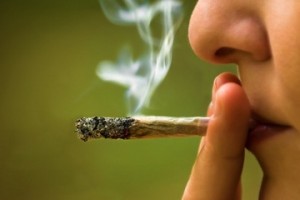Marijuana use changes brain’s reward system overtime
June 9 2016

Researchers found that individuals who were long-term marijuana users had increased activity in certain areas of the brain associated with reward when presented with marijuana-associated cuesMarijuana use changes brain’s reward system overtime , compared with when they were presented with fruit-associated cues.
Study co-author Dr. Francesca Filbey, of the School of Behavioral and Brain Sciences at the University of Texas at Dallas, and colleagues publish their findings in the journal Human Brain Mapping.
Though marijuana is the most commonly used illicit drug in America, with around 22.2 million users in the past month, an increasing number of states are legalizing its use for recreational or medical purposes.
However, despite this increase in marijuana legalization, Dr. Filbey and colleagues note that there is limited information on how the drug might lead to problematic use.
While only a small number of studies have investigated how marijuana use impacts the neural circuits of the brain to trigger cravings for the drug, some of these studies have suggested that the mesocorticolimbic reward system is involved.
This system incorporates several brain regions that release dopamine – a neurotransmitter that regulates the reward and pleasure centers – in response to certain cues.
Marijuana use disrupts mesocorticolimbic reward system
To further investigate how marijuana use might affect the mesocorticolimbic reward system, the team enrolled 59 daily, long-term marijuana users – who had used the drug for an average of 12 years – alongside 70 non-users.
Fast facts about marijuana
Tetrahydrocannabinol (THC) is the main active ingredient in marijuana
In 2011, there were almost 456,000 drug-related emergency department visits in the U.S. in which marijuana use was involved
Altered senses, change in mood, impaired body movement, and problems with thinking and memory are just some of the effects of marijuana use.
Learn more about marijuana
Both groups were presented with visual cues. These included marijuana-associated images, such as a joint, bong, or pipe, and self-selected images of preferred fruits, such as a banana, an apple, or grapes.
The researchers explain that fruit is a natural reward cue that is “inherently salient and represented in the brain’s reward system.”
During the stimuli task, the researchers assessed the participants’ brain activity using functional magnetic resonance imaging (fMRI).
The team found that long-term marijuana users showed greater activity in the mesocorticolimbic reward pathways of the brain when they were presented with marijuana-associated cues than when they were shown images of preferred fruits.
Specifically, in response to marijuana-associated cues, long-term users had greater brain activity in the orbitofrontal cortex, striatum, anterior cingulate gyrus, precuneus, and the ventral tegmental area (VTA).
The researchers also found that the greater the interference of natural reward pathways in response to marijuana cues, the more problems that were experienced as a result of marijuana use, such as family problems.
With drug and alcohol testing centers throughout the entire United States, Accredited Drug Testing Inc. is available to answer all of your drug and alcohol testing questions and needs. For more information contact:
Brandon Rains
Director Of Online Marketing
Brandon@accredtiteddrugtesting.com
https://accrediteddrugtesting.net
(800) 221-4291
Accredited Drug Testing Inc
Health Screening USA Inc
